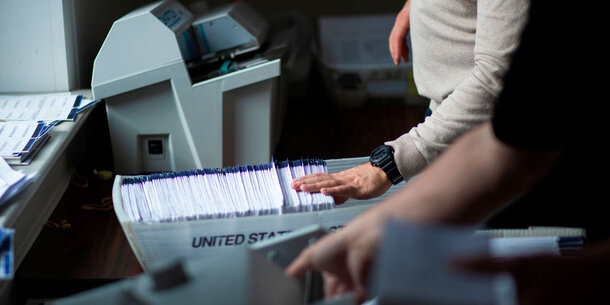Election certification has long been an unfamiliar term to most Americans, and for good reason. Certification, the statutory process by which officials sign off on the accuracy and completion of election results, usually serves as an important but drama-free formality carried out after the excitement of an election winds down.
Then came the 2020 election and its false claims of widespread voter fraud. On January 6, insurrectionists supporting President Trump stormed the Capitol in an attempt to stop Congress from certifying the election results. Despite the attack, certification ultimately proceeded as planned. And nearly two years later, Congress succeeded in passing reforms that will make it more difficult for partisan actors to manipulate the process of counting the Electoral College votes for president. But as my co-author Will Wilder and I explain in a new article in the Stanford Law & Policy Review, attacks on certification did not end after January 6 — they merely shifted to the local and state level.
Cochise County, Arizona, provides a prime recent example. In November 2022, the county’s board of supervisors voted against certifying the county’s general election returns, citing vague concerns that the county’s voting machines could not be trusted. But later, one of the supervisors admitted that their refusal to certify was really a protest against the election in nearby Maricopa County, where a ballot printing error ignited a firestorm of conspiracy theories that the glitch resulted in mass election fraud.
The board’s refusal to certify threatened to disenfranchise every voter in Cochise County. Arizona law required state officials to begin gathering county returns no later than December 8. This left them with no choice but to complete the process without the county’s 47,000 votes if the board did not certify in time. In the end, the dispute concluded only after a state judge ordered the board to certify the results without delay, explaining that the board had no discretion to refuse to certify the results under Arizona law.
Cochise County was not an isolated incident. During the 2022 election cycle, rogue local officials in Otero County, New Mexico; Esmeralda County, Nevada; Berks, Fayette, Lancaster, and Luzerne Counties, Pennsylvania; Surry County, North Carolina; and Mohave County, Arizona all refused or threatened to refuse to certify valid election results based on claims rooted in election denialism — the false idea that the 2020 election was stolen and that widespread fraud continues to pervade our election system.
Fortunately, courts and state officials intervened in each of these instances to compel certification. But such attacks still cause harm. By invoking false claims of large-scale fraud, each refusal to certify threatens to validate the broader election denier movement while sowing disorder in state election administration processes. Few officials who refused to certify have faced consequences for their actions. And election deniers show no sign of slowing down ahead of the next election cycle. As recently as November 2023, the Colorado Republican Party circulated a letter advising counties to refuse to certify that month’s election results based on unsupported allegations of a “rigged system.”
Against this backdrop, our article sets out to fill a gap in legal scholarship: historically, little academic attention has been paid to the mechanics of state certification processes, leaving many in the legal community bewildered by the recent string of attacks.
First, our research revealed that certification crises are not, in fact, new. For as long as our country has held elections, rogue local officials have attempted to manipulate and interfere with election certification. In one exemplary case from 1899, local officials in Coffee County, Georgia refused to proceed with certification based on minor procedural flaws remarkably similar to those cited by the Cochise County supervisors in 2022.
Early American state courts and legislatures took notice. Recognizing that leaving room for discretion in certification created risks for precisely the type of disputes and misconduct that we see today, they purposefully shaped election certification into a mandatory, nondiscretionary duty with well-established protections against those who aim to manipulate the results. In the prescient words of the 1909 Oklahoma Supreme Court, allowing local certifying officials “who are generally without training in the law” to go behind election returns and investigate the election itself “would afford temptation and great opportunity for the commission of fraud.”
This reasoning seems almost prophetic in light of the modern election denier movement. It offers a reminder that while certification crises may feel new in today’s political climate, centuries of precedent exists to resolve them. In other words, modern state certification frameworks were designed with the specific goal of preventing rogue election officials from disrupting the process. At the same time, our findings also underscore a darker reality: those who refused to certify elections in 2022 did so in spite of this longstanding consensus.
In our new article, we confront this dilemma by offering a roadmap for election officials, candidates, and advocates to resolve future certification attacks. In addition to tracing the historical development of state certification laws, the article provides a detailed overview of how modern election certification works and how recent attacks on the process have targeted and disrupted certification using false claims of widespread fraud. It concludes with an analysis of the certification processes and enforcement mechanisms in eight battleground states likely to play significant roles in the 2024 election cycle.
Attacks on certification, like many election denier threats, have never been deployed on such a large and coordinated scale. But by looking to the past, we can identify the guardrails that will protect us in the future.



